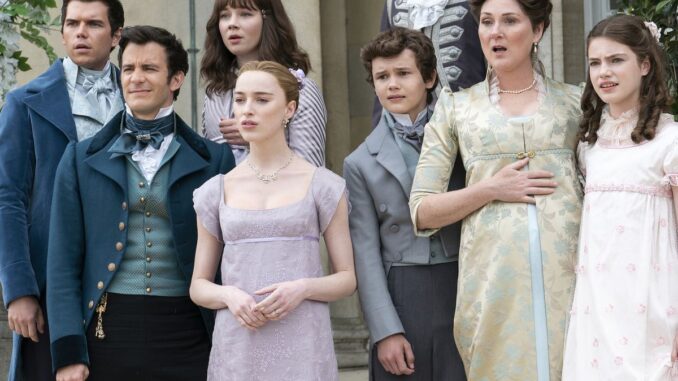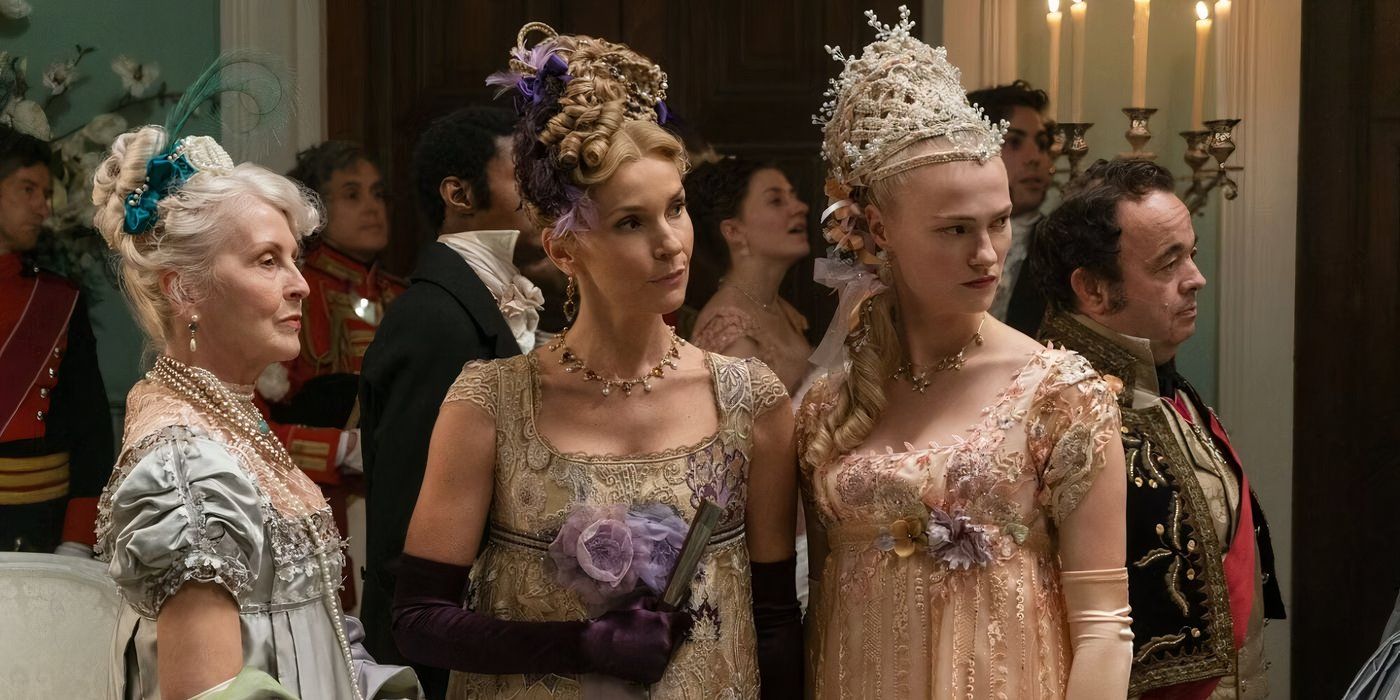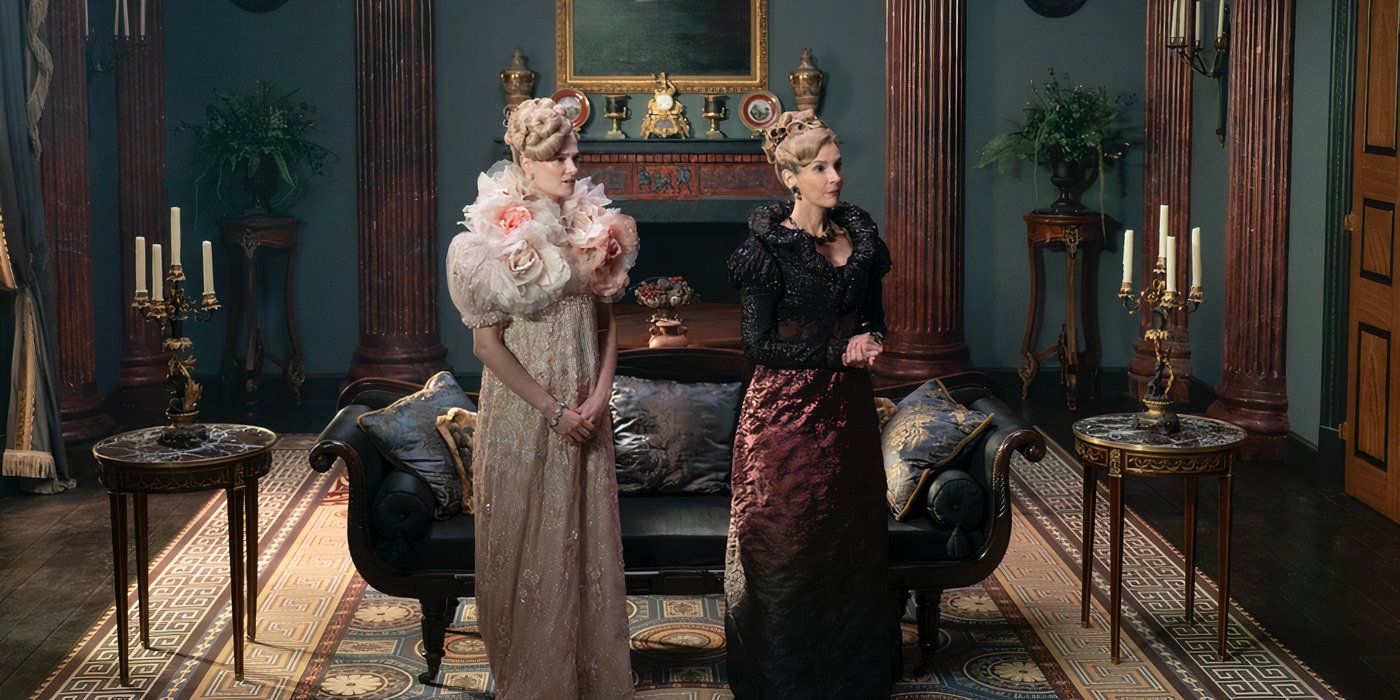
Salacious gossip from scandalous characters — that’s exactly what hit Netflix series Bridgerton excels at. The voracious readers of Lady Whistledown’s column, and the equally hungry viewers of the show, can’t help but be enthralled by rogueish characters, whose scheming and biting comments make for thoroughly addicting entertainment. But even more so than tantalizing rumors, audiences love a good redemption story: watching a rake become a gentleman, a villain becoming a hero. Season 3 closes with an exceptionally happy example: the Featherington family, once a pestering nuisance in the ton, crystallizes into something truly heartwarming after the ladies learn to forgive and be kind to one another after seasons of antagonism. Looking forward to the future of the series, there’s one character perfectly poised to have the next compelling victory lap: Miss Cressida Cowper (Jessica Madsen).
One of the sharper-tongued people in Mayfair, Cressida played rival debutante to Daphne (Phoebe Dynevor), effectively, if not incessantly, owning the screen as an infuriating antagonist. But after developing a friendship with Eloise (Claudia Bridgerton) in Season 3, the depth of Miss Cowper is far more apparent. Brought up by a cold and unloving family, Cressida is a far more tragic figure whose positive traits are darkened by society’s unfair expectations. Cressida hits her lowest point in Season 3, but after demonstrating her capacity for kindness and self-improvement, her return to society may be the perfect opportunity for a most deserving redemption tour.
Cressida Cowper Was Daphne’s Rival and the Thorn in Penelope’s Side
From being Daphne’s debutante rival to wannabe Lady Whistledown, Cressida has always been a prickly antagonizing force for much of the series. Introduced as the classic mean girl archetype, Cressida is petty, judgmental, and just downright rude to the other young women. When Queen Charlotte’s (Golda Resheuvel) nephew, Prince Frederick (Freddie Stroma), arrives to the ton, it’s Cressida who first makes tries to catch the prince’s attention until Daphne steals his attention away. Cressida plays a similar role in the next season, accidentally making unbecoming remarks about Penelope (Nicola Coughlan) that are sorely received. And again, despite receiving attention from Jack Featherington, a potential suitor, Cressida is once again unable to secure a marriage match. This time it’s because of Portia Featherington’s (Polly Walker) intervention, trapping the young woman’s would-be suitor in an unexpected marriage. Throughout these earlier appearances, Cressida’s failure in the marriage mart feels like a good thing, emphasizing that mean-spirited people shouldn’t be rewarded. And yet, Cressida later proves that she has many more redeeming qualities than she is given credit for.
Cressida’s Unlikely Friendship With Eloise Highlighted Her Good Side

When Eloise and Penelope’s friendship is fractured after the latter is revealed to be Lady Whistledown, it’s Cressida, of all people, who becomes the outspoken Bridgerton’s newest friend. Cressida’s friendship with Eloise is one of the highlights of the third season, an unexpected but wholeheartedly pleasant combination. Surprisingly, the two prove to be quite a compatible duo. It’s in these interactions that Cressida is shown to have more depth and strength of character than her earlier portrayals. Though less academic in her interests than Eloise, Cressida is still able to match wits in conversation with her new friend.
Despite their contrasting personalities, the two women’s strengths complement one another, rather than hold them back. Eloise is unafraid to criticize Cressida’s cruelty when she intentionally ruins Penelope’s dress. In turn, Cressida is bold enough to challenge Eloise’s self-righteousness, calling for her friend to admit to her mistakes rather than blame others. Together, they are even able to be candid about the trappings of society, as Cressida notes how the marriage season intentionally pits women against each other in competition, often bringing out their worst aspects. Though it doesn’t excuse her behavior, Cressida does show remorse over her previous mistreatment, signaling her potential for improvement in the future.
Cressida Is Another Victim of Society’s Unfair Rules and Expectations

In the latter half of Season 3, Cressida once more becomes an antagonistic force as her friendship with Eloise deteriorates. But unlike previous seasons, Cressida is significantly more sympathetic. Having already spoken about feeling trapped in society, the young Miss Cowper is further imprisoned by her family’s cold and rigid rules. Her own mother acquiesces to marrying her off to a man old enough to be her grandfather and so feverishly restrictive that he doesn’t even allow music in his home.
This season explores the claustrophobia of feeling helpless and voiceless as a woman in society primarily through Penelope’s eyes, but Cressida is just as much a prisoner of the same sexist biases that affect all the ladies in the ton. In fact, as Cressida attempts to steal credit for being Lady Whistledown, it fully illustrates how much she and Penelope parallel one another. However, unlike Penelope, Cressida doesn’t have the literary and observational skills to become a renowned author. But just like Penelope, she understands that Whistledown is a means of escaping the unfair future that awaits her in Mayfair.
Cressida fails, not just in deceiving the Queen into believing she is the clandestine author, but in being kind as well. Cressida’s choice to blackmail Penelope is framed as a truly heinous act, but that doesn’t fully encapsulate the gravity of the situation. Unlike the familial camaraderie of the Bridgertons (and even the Featheringtons at this point) the Cowper family is the source of Cressida’s anguish, not the solution. The season ends with Cressida at her lowest — alone, mistrustful, defeated — as she’s sent with her vulture-like aunt to Wales.
Cressida Had a Happier Alternate Ending for Season 3
But, Cressida’s story doesn’t feel over yet. Jessica Madsen shared that they had actually shot an alternate ending for Cressida’s season, concluding with a last-minute rescue and escape. However, Shonda Rhimes felt that this was too conclusive of an ending for the character, whose story could still be told in future seasons. With an opinion like that from the show’s creator, a comeback story for Cressida becomes that much more tantalizing. Of the recurring characters in the series, Cressida has the most potential for a blazing redemption tour. Despite her more petty and unwise decisions, she has been able to show that she’s capable of kindness and greater things. She’s bold and daring enough to arrive, uninvited, to a ball in a striking red gown to challenge the Queen herself. Even among the most ambitious characters, Cressida’s fiery desire to gain freedom should be on everyone’s radar.
Though being sent to Wales feels like a conclusive punctuation mark on Cressida’s story, it should more so be seen as an opportunity for growth and a new narrative direction. As Eloise travels to Scotland, and as Colin (Luke Newton) once travelled the continent, so too can Cressida return to Mayfair with a broadened outlook on life (and maybe less extravagant outfits). The tragedy of family, circumstance, and the trappings of society are a hurdle that the best characters have overcome thus far, and with an exceptional actress like Jessica Madsen in the role, next season might be the perfect time for a redemption tour from one Miss Cressida Cowper.
Bridgerton Season 3 Part 2 is streaming now on Netflix in the U.S.
